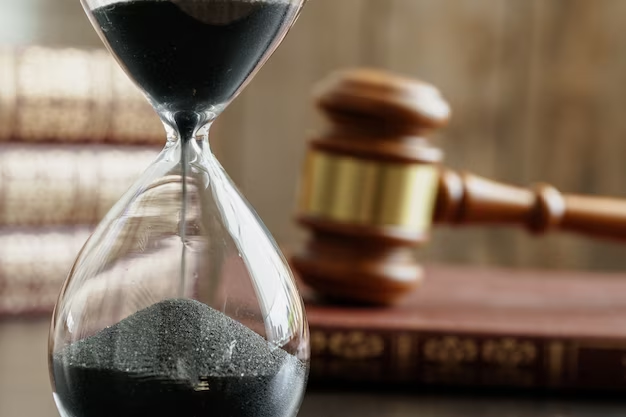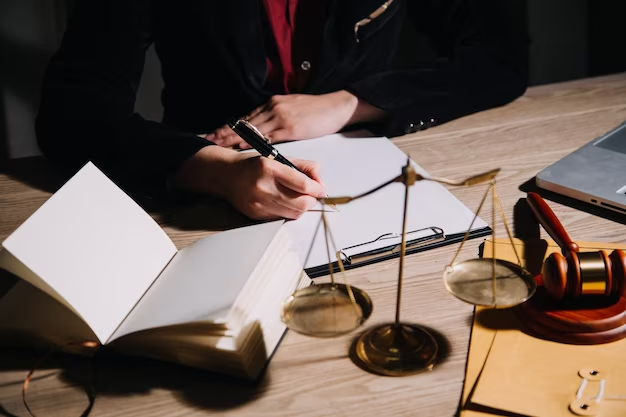Have you ever wondered, “why is my lawyer taking so long to settle my case?” You’re not the only one. This inquiry troubles numerous clients who are eager to bring their legal issues to a conclusion. In this piece of writing, we’ll explore why there may be delays and illuminate some of the perplexing aspects of legal proceedings.
Understanding Legal Timeframes

There is a lot of variation when it comes to the complexity and duration of legal cases. To simplify things, we can categorize these timeframes into two types: simple cases and complex cases. There are several factors that contribute to how long a case might take, such as the discovery phase, negotiations between parties involved in the dispute, or scheduling issues with courts themselves.
The Various Types of Legal Cases and Their Average Durations
To comprehend the legal time limits, it’s crucial to differentiate between uncomplicated and intricate cases. Presented below is a categorization of standard timelines applicable to various types of cases:
| Case Type | Average Timeframe | Description |
| Small Claims | 2-3 months | Minor financial issues are predominantly the subject of small claims cases known for their speedy resolution, typically taking only several months to conclude. These proceedings generally follow uncomplicated legal procedures and involve straightforward matters. |
| Personal Injury | 1-2 years | Personal injury lawsuits are often lengthy and intricate affairs due to their nature of demanding compensation for injuries resulting from mishaps or carelessness. Their prolonged duration can be attributed chiefly to the requirement for exhaustive probes, medical assessments, and negotiations between all concerned parties. |
| Divorce | 6 months – 1 year | The duration of divorce cases differs depending on factors such as property division complexity, spousal support disputes, and child custody arrangements. Shorter timelines are typical for uncontested divorces, while longer periods may be required to resolve complex issues in contested divorces. |
| Criminal Cases | 6 months – 18 months | Criminal cases encompass accusations of unlawful conduct and are categorized as misdemeanors or felonies. The timeframe for their resolution is influenced by several factors including the gravity of allegations, the accessibility of proof, and legal schedules. Criminal lawsuits involving intricate charges along with numerous witnesses typically prolong the duration to reach an outcome. |
Factors Contributing to Delays
Understanding the factors that contribute to delays in legal cases can provide insight into why some cases take longer than others. These factors include:
The Discovery Phase
The discovery phase represents a pivotal stage in the legal process where both parties involved gather evidence, documents, and information that are pertinent to the case at hand. This phase serves the crucial purpose of ensuring transparency, allowing each side to understand the strengths and weaknesses of their respective claims. However, it is also a phase that can contribute significantly to case delays due to a variety of reasons.
- Volume of Information: In complex cases, which might involve extensive evidence, numerous witnesses, or a substantial volume of documents, the discovery phase can become protracted. The sheer volume of information that must be reviewed, organized, and analyzed can consume an enormous amount of time.
- Disputes Over Disclosure: Disagreements between the parties regarding what information should be disclosed can lead to protracted litigation within the discovery phase itself. This can result in motions, hearings, and additional delays as the court intervenes to resolve these disputes.
- E-Discovery Challenges: In the digital age, electronic discovery (commonly referred to as e-discovery) has become increasingly complex. Retrieving, processing, and analyzing electronic data can be a time-consuming endeavor, often requiring specialized technical expertise and software tools.
- Third-Party Involvement: In cases where third parties possess relevant information, coordinating their participation in the discovery process can lead to delays. These third parties may not prioritize the litigation’s timeline, leading to scheduling conflicts and extensions.
Negotiations Between Parties
Many legal cases involve attempts to settle through negotiations and alternative dispute resolution mechanisms. While reaching a settlement can expedite the resolution process, the inability to reach an agreement swiftly can result in the continuation of litigation and further delays.
- Complexity of Issues: Highly intricate legal matters may necessitate extensive negotiations to find common ground. This can consume an inordinate amount of time, particularly when parties have divergent interests and viewpoints.
- Emotional Factors: Emotional or personal factors can significantly impede negotiations. Parties may have deeply rooted grievances or animosities that hinder cooperation and compromise, prolonging the negotiation phase.
- Multiple Parties: Cases involving multiple parties, such as class actions or multi-defendant lawsuits, often require prolonged negotiations to align the interests of all parties involved. Coordinating the needs and demands of multiple stakeholders can be a complex and time-consuming process.
Court Schedule Congestions
The efficiency of the court system is a critical factor in determining case delays. Courts frequently grapple with congested schedules, which can lead to the postponement of trials and hearings, resulting in significant delays for litigants.
- High Caseloads: Overburdened court dockets can lead to scheduling conflicts and delays. Courts must allocate limited time and resources to a multitude of cases, causing delays for all parties involved as they await their turn in a crowded docket.
- Unforeseen Circumstances: Unexpected events, such as emergencies or the unavailability of key personnel such as judges, attorneys, or witnesses, can disrupt court schedules. These unforeseen circumstances necessitate rescheduling, causing delays that are often beyond the control of the litigants.
- Backlog: Courts may grapple with a backlog of cases, especially in jurisdictions with limited resources. Older cases may take precedence over newer ones, causing delays for the latter as the court prioritizes clearing its docket.
Delving Deeper into Delays

We’ve uncovered that the duration of a case can be influenced by factors such as case type and complexity. However, it’s essential to delve even deeper into the various elements contributing to delays in legal proceedings. Let’s dissect the intricacies of these delays, emphasizing the importance of understanding legal procedures, client-lawyer communication, and the constraints of the judicial system.
Legal Procedures and Protocols
Legal processes are inherently intricate and often entail a significant investment of time. Here, we will break down some of the key aspects contributing to these time-consuming procedures:
- Detailed Investigations: One of the fundamental reasons behind delays in legal cases is the need for thorough investigations. These investigations are conducted to gather evidence, interview witnesses, and establish the facts of the case. In complex cases, this phase can be particularly protracted, as uncovering critical information may take time.
- Evidence Collection: Gathering and presenting evidence is a pivotal aspect of any legal case. This process includes obtaining documents, medical records, financial records, and other pertinent information. The time spent on this task can vary depending on the availability and accessibility of evidence.
- Procedural Protocols: Legal cases are bound by a set of procedural protocols and rules that must be followed meticulously. These protocols ensure fairness, due process, and the protection of the rights of all parties involved. Adhering to these rules can sometimes introduce additional steps and consequently extend the duration of the case.
Client-Lawyer Communication
Effective communication between clients and their lawyers is paramount in legal proceedings. Misunderstandings or miscommunications can be a significant source of delays. Here are some aspects to consider:
- Clear Instructions: Clients must provide their lawyers with clear and comprehensive instructions regarding their case. Vague or incomplete information can lead to confusion and delays in the legal process.
- Timely Responses: Lawyers often require prompt responses from their clients regarding queries, document requests, or updates. Delays in communication from the client’s side can slow down the progress of the case.
- Managing Expectations: Lawyers should ensure that their clients have realistic expectations about the duration of the case. Clear communication about potential delays and setbacks can help clients understand the process better.
Judicial System Constraints
Another crucial factor contributing to delays in legal cases is the constraints within the judicial system itself:
- Backlogged Cases: Courts often contend with a backlog of cases, meaning there are more cases awaiting resolution than the court system can handle promptly. This backlog can lead to delays in securing hearing dates and receiving court decisions.
- Scheduling Conflicts: The availability of judges, attorneys, witnesses, and other parties involved can sometimes create scheduling conflicts, causing postponements and delays in court proceedings.
- Complexity of the Case Load: The complexity of cases can vary widely, and some intricate matters may require more time for thorough deliberation and consideration by the court.
Specific Reasons Why Your Lawyer Might Be Taking Long
When you’re involved in a legal matter, it can be frustrating if you feel that your lawyer is taking longer than expected to resolve your case. However, there are several specific reasons why this might happen. In this article, we will delve into these reasons in detail, providing insights into why your lawyer’s timeline may not align with your expectations.
Collecting and Analyzing Evidence
One of the primary reasons for delays in legal proceedings is the process of collecting and analyzing evidence. This is a crucial step in building a strong case, and it can be time-consuming. Lawyers must gather documents, interview witnesses, and review information thoroughly. Below is a table summarizing the key points regarding evidence collection:
| Step | Description |
| Document Gathering | Retrieving relevant documents such as contracts, medical records, and financial statements. |
| Witness Interviews | Conducting interviews with potential witnesses to gather their statements and testimonies. |
| Evidence Evaluation | Carefully assessing the collected evidence to determine its relevance and strength. |
Negotiating with Other Parties
Legal disputes often involve negotiation with other parties, which can be a protracted and iterative process. Lawyers engage in discussions, exchange proposals, and work toward a mutually acceptable resolution. This can be time-consuming, as both parties may have different positions and interests. The following bullet points provide a breakdown of the negotiation process:
- Preliminary negotiations to establish initial terms.
- Exchange of offers and counteroffers.
- Legal analysis of proposed agreements.
- Finalizing and formalizing the negotiated settlement.
Awaiting Court Dates
The scheduling of court dates can significantly impact the timeline of your legal case. Courts are often overloaded with cases, and securing a hearing date can take time. Additionally, court dates may be postponed or rescheduled due to various reasons. This unpredictability can lead to delays in your case. It’s essential to understand the factors affecting court scheduling:
- Case backlog in the court system.
- Availability of judges and courtrooms.
- Prioritization of cases based on urgency.
Legal Formalities and Compliance
Ensuring that all legal documents are filed correctly and in compliance with the law is a crucial aspect of legal proceedings. Lawyers must meticulously prepare and review paperwork to avoid potential legal complications. Here are some key aspects of legal formalities and compliance:
- Drafting legal documents, such as contracts, pleadings, and motions.
- Conducting legal research to ensure compliance with current laws and regulations.
- Submitting documents to the appropriate authorities within specified deadlines.
Changes in Legal Staff
Turnover within your lawyer’s team can also contribute to delays in your case. New staff members may need time to familiarize themselves with the specifics of your situation, leading to transitional delays. It’s essential to recognize the potential effects of staff changes and how they can impact your case:
- Transition period for new team members.
- Ensuring continuity and proper handover of case information.
Your Own Responsiveness
Clients play a crucial role in the pace of legal proceedings. Your lawyer may require your input, documents, or responses to move the case forward efficiently. If clients are unresponsive or fail to provide necessary information promptly, it can lead to delays. To prevent this, clients should prioritize communication and cooperation with their legal counsel. Key points to consider include:
- Promptly providing requested documents and information.
- Maintaining open and clear communication with your lawyer.
Conclusion
Asking “Why is my lawyer taking so long?” is a valid concern. Understanding the intricacies of legal procedures, acknowledging external factors like court backlogs, and maintaining open communication with your lawyer can help ease your anxiety. Remember, quality legal work often requires time and patience.
FAQ
Q: Can I speed up my case?
A: You can ensure timely responses and document submissions, but some aspects are beyond your control.
Q: Should I be worried if my case is taking long?
A: Not necessarily. It’s often a sign of the thoroughness and complexity of legal proceedings.
Q: How often should I expect updates from my lawyer?
A: This varies, but typically once a month or at significant stages of your case.
Q: Can I change my lawyer if my case is taking too long?
A: Yes, but consider if this will cause further delays.
